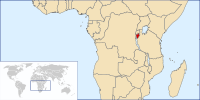Portal:Burundi
The Burundi PortalA view of Bujumbura, Burundi
Burundi (/bəˈrʊndi/ ⓘ, /-ˈrʌn-/), officially the Republic of Burundi (Kirundi: Repubulika y’Uburundi,[1] [u.βu.ɾǔː.ndi]; Swahili: Jamuhuri ya Burundi; French: République du Burundi}}, [buʁundi] or [byʁyndi]), is a landlocked country in the Great Rift Valley where the African Great Lakes region and East Africa converge. It is bordered by Rwanda to the north, Tanzania to the east and southeast, and the Democratic Republic of the Congo to the west; Lake Tanganyika lies along its southwestern border. The capital cities are Gitega and Bujumbura, which is also the largest city.[2] One of the smallest countries in Africa, Burundi's land is used mostly for subsistence agriculture and grazing, which has led to deforestation, soil erosion and habitat loss.[3] As of 2005 the country was almost completely deforested, with less than 6% of its land covered by trees and over half of that being commercial plantations.[4] In addition to poverty, Burundi often suffers from corruption, weak infrastructure, poor access to health and education services, and hunger.[5] Burundi is densely populated and many young people emigrate in search of opportunities elsewhere. The World Happiness Report 2018 ranked the nation as the world's least happy with a rank of 156.[6] Burundi is a member of the African Union, Common Market for Eastern and Southern Africa, United Nations and the Non-Aligned Movement. Selected article -Michel Micombero (26 August 1940 – 16 July 1983) was a Burundian politician and army officer who ruled the country as de facto military dictator for the decade between 1966 and 1976. He was the last Prime Minister of the Kingdom of Burundi from July to November 1966, and the first President of the Republic from November 1966 until his overthrow in 1976. Micombero was an ethnic Tutsi who began his career as an officer in the Burundian military at the time of Burundi's independence in 1962. He studied abroad and was given a ministerial portfolio on his return. He rose to prominence for his role in helping to crush an attempted coup d'état in October 1965 by ethnic Hutu soldiers against the Tutsi-dominated monarchy. In its aftermath, in 1966, Micombero himself instigated two further coups against the monarchy which he perceived as too moderate. The first coup in July installed a new king on the throne, propelling Micombero to the role of prime minister. The second coup in November abolished the monarchy itself, bringing Micombero to power as the first president of the new Republic of Burundi. (Full article...)General images -The following are images from various Burundi-related articles on Wikipedia.
More Did you know (auto generated)
Did you know -
Wiki Loves Africa in Burundi
CategoriesRelated portalsWikiProjectsSelected picture -TopicsAssociated WikimediaThe following Wikimedia Foundation sister projects provide more on this subject:
Sources
Discover Wikipedia using portals | ||||















































